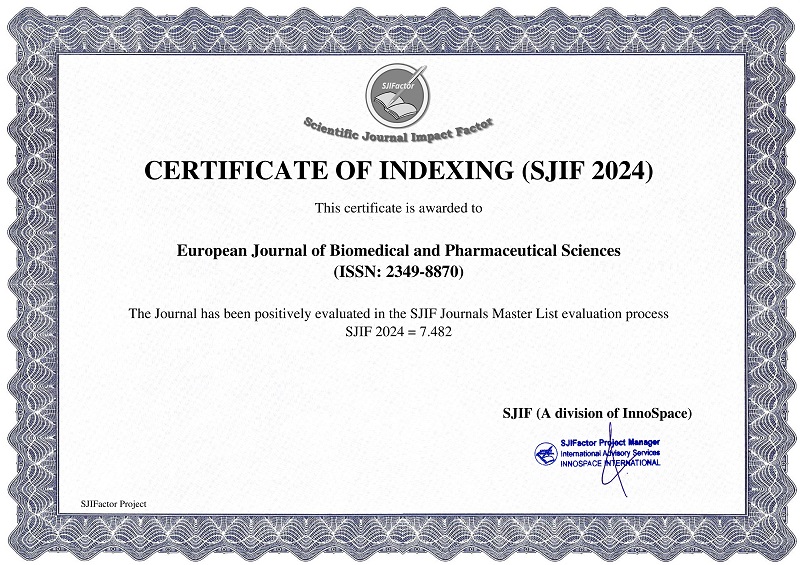EVALUATION OF CYTOKINE PROFILE DURING MENSTRUAL CYCLE AMONG ADULT FEMALES IN PORT HARCOURT
Stellamaris Ejianreh*
ABSTRACT
Menstruation is a natural occurrence among young adult female of reproductive age with evidence of vagirnal bleeding which is regulated by hormones and end result is usually pregnancy. This was a longitudinal study carried out with the aim of evaluating cytokines levels at different phases of menstrual cycle in dysmenorrheic young adult females within the age range of 18-30 years attending University of Port Harcourt, Choba, River State, Nigeria. A total of sixty (60) apparently healthy menstruating females participated of which thirty (30) were dysmenorrhea and thirty (30) control eumenorrhea females. Three milliliters of whole blood was drawn from each subject using standard veinpuncture technique and was allowed to clot and serum was separated for the analysis using enzyme linked immunosorbent assay (ELISA) method, at follicular, proliferative, and secretary phases. The data obtained were analysed using Statistical Package for Social Science (SPSS) version 20. Comparison of mean for the parameters of the three phases was done using ANOVA, IL-6, TNFα and IL-10 were significantly varied (F=33.22, P<0.01, F=29.96, P=0.02, F=58.06, P=0.01) respectively. To identify the phase that had significant mean difference, Tukey’s Post Hoc test was used. IL-6, TNF, and IL-10 (p=0.01) had significant mean difference between the three phases where as IL-1B show no difference (P=0.4). Using Spearson’s correlation coefficient, IL-6 was positively correlate with TNFα (r=0.578 p=0.001) at the secretary phases. The finding of this study recorded a significant variation in the three phases of the cycle of study with higher levels of the pro-inflammatory cytokines IL-6 at follicular phase, TNFα at proliferative phase and anti inflammatory cytokine IL-10 at secretary phase and there was no statistically significant difference in IL-1beta when compared across the phases. However, the cytokines profiled were significantly higher in dysmenorrhea females than control group. This study indicated that the variations of cytokines during menstrual phases could cause hypercontractility resulting in painful menstruation (dysmenorrhea) and could also be implicated in autoimmune disease and decidualization of the uterus. It is therefore recommended that menstrual dysfunction should be an important topic for global reproductive health campaigns; also females should be educated on cause, implication, and importance of timely management of menstrual disorder.
Keywords: Menstrual cycle, follicular, proliferative secretary female, dysmenorrhea, cytokines, Nigeria.
[Full Text Article]
[Download Certificate]


 Impact Factor : 8.181
Impact Factor : 8.181 






